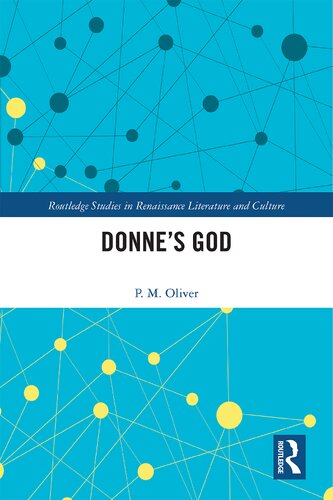

Most ebook files are in PDF format, so you can easily read them using various software such as Foxit Reader or directly on the Google Chrome browser.
Some ebook files are released by publishers in other formats such as .awz, .mobi, .epub, .fb2, etc. You may need to install specific software to read these formats on mobile/PC, such as Calibre.
Please read the tutorial at this link. https://ebooknice.com/page/post?id=faq
We offer FREE conversion to the popular formats you request; however, this may take some time. Therefore, right after payment, please email us, and we will try to provide the service as quickly as possible.
For some exceptional file formats or broken links (if any), please refrain from opening any disputes. Instead, email us first, and we will try to assist within a maximum of 6 hours.
EbookNice Team

Status:
Available0.0
0 reviewsHis contemporaries recognised John Donne (1572-1631) as a completely new kind of poet. He was, wrote one enthusiast, ‘Copernicus in Poetrie’. But in the winter of 1614-15 Donne abandoned part-time versification for full-time priestly ministry, quickly becoming one of the most popular preachers of his time. While his verse has never been short of modern admirers, his sermons have recently begun to receive their full share of serious attention. Yet there exists almost no theologically-informed criticism to assist readers with navigating, let alone appreciating, the intricacies of Donne’s religious thinking. The need for such criticism is especially urgent since many readers approach his writing today with little previous knowledge of Christian doctrine or history. This book supplies that deficiency. Starting from the assumption that theology is inevitably the product of the human imagination, a perception that is traced back to major early Christian writers (and something that Donne implicitly acknowledged), it probes the complex amalgam that constituted his ever-shifting vision of the deity. It examines his theological choices and their impact on his preaching, analysing the latter with reference to its sometimes strained relationship with Christian orthodoxy and the implications of this for any attempt to determine how far Donne may legitimately be viewed as a mouthpiece for the Jacobean and Caroline Church of England. The book argues that the unconventionality that characterises his verse is also on display in his sermons. As a result it presents Donne as a far more creative and risk-taking religious thinker than has previously been recognised, especially by those determined to see him as a paragon of conventional Christian orthodoxy.